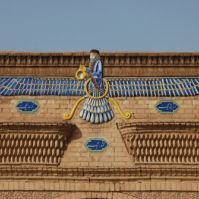
France enacts laws and regulations regarding secular schools, and some Muslims say that their religion is a special target. Following the awful killings of satirical journalists and Jewish store patrons in Paris in January, many see renewed interest and emphasis on the declared state policy of absolute secularity in public spaces, particularly french schools.
Secularism by Law
For over a century, French laws have declared the state policy of secularism. In public places, religion is excluded from display and dialogue in the nation's effort to be open to all, and without offense to any, over the very personal issue of faith. In recent years, controversy has swirled over bans on particular clothing in public schools. Under a 2004 law, obvious indications of religion are forbidden on schoolchildren, including:
- Skullcaps for Jews
- Crosses for Christians
- Headscarves for Muslims
Students have been sent home and even threatened with expulsion for violating the clothing code. Some believe that the schools' strict interpretations of the law are going too far in their attempt to enforce the appearance of a wholly secular society in the schools.
Shocking Moment
Stricter application of the secularism rules and additional education on multiculturalism, respect and tolerance are building momentum in the wake of the January terrorist attacks in Paris. Teachers in schools that have significant Muslim student populations were shocked when many students refused to observe the moment of silence for the victims of the Charlie Hebdo killings.
The words that teachers reported hearing shocked them further when there were grumblings in the classroom that the killings were justified. A teacher reports that three-quarters of his students refused to honor the dead with a moment of silence: "They considered it forbidden to make blasphemies or insult the prophet through drawings or speech."
Widespread Refusal
Teachers throughout the country reported up to 200 similar instances. Some reported students "glorifying terrorism" after the killings. Indicative of the substantial rift in the culture, school administrators are instituting programs that will aim to "re-establish the authority" of the teachers.
Nearly 1,000 educators will receive training on France's laws requiring secular schools without religious trappings. Students are set to get "moral and civic training" on things like how to fight anti-Semitism, racism and all forms of discrimination.
Symbolic Skirt
Authorities at a secondary school in France sent a girl home because the long black skirt she wore seemed an obvious indication of her Muslim identity. Observers and her family note that it was an ordinary full-length skirt purchased at a clothing store in town, with no indications of religion that are obvious from its fabric or appearance.
The teacher saw the black maxi skirt as a challenge to the secular dress code of the school, though. There have been similar battles over headbands that the young woman and others wore, which authorities saw as a way to evade the ban on headscarves. The girl and others explained that Muslim girls show their respect for the rules by removing their headscarf before entering the building.
The teacher saw her long skirt as a continued part of the distinctive outfit he associates with Muslim women and sent her home to her parents with a note that implied the threat of expulsion if the clothing issue continued to be a problem at the school.
Seeing Beyond Differences
The attempts by some people in France to hide all evidence of religion in the public sphere, especially in schools, are lauded by some and loathed by others. The effort to enforce a uniform irreligious place in society can backlash and create victimhood among some groups that feel the regulations target them especially. Educators in France are learning more lessons in accommodating all in a multicultural society, with some success and some struggle.



